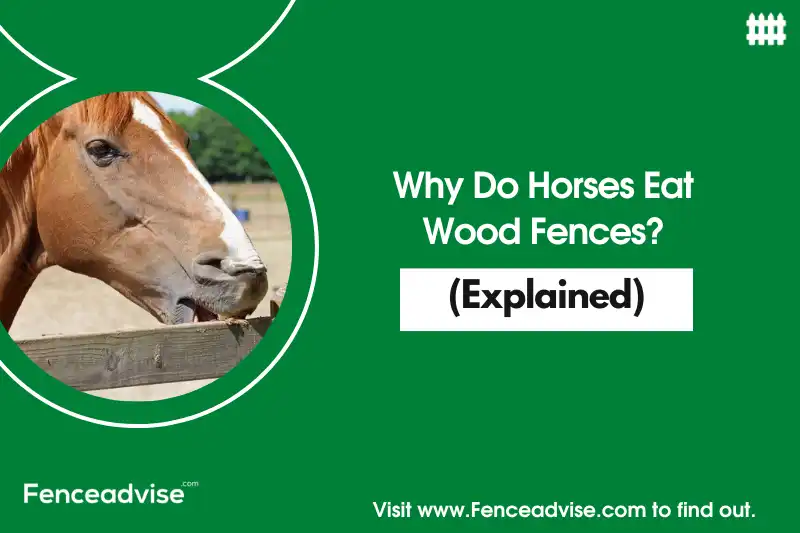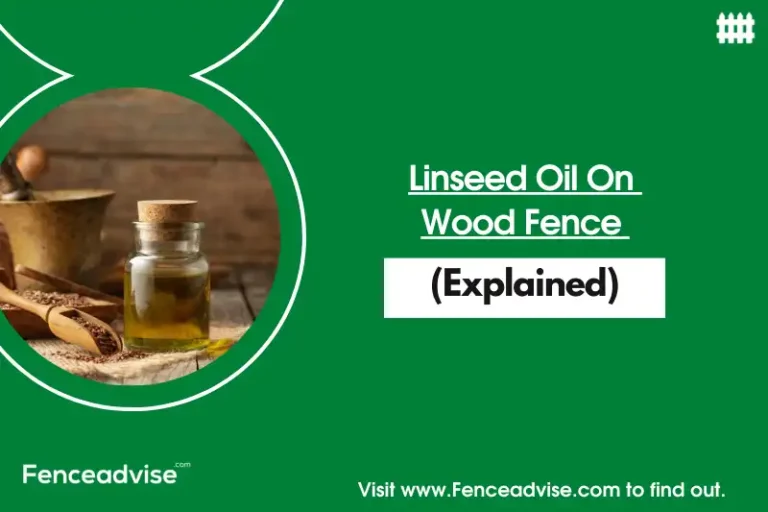We include products we think are useful for our readers. If you buy through links on this page, we may earn a small commission. Read our affiliate disclaimer here.
Imagine a serene countryside scene, where a magnificent horse grazes peacefully in a lush pasture. But wait! Amidst this picturesque setting, something peculiar unfolds—the horse begins nibbling on the very wooden fence designed to confine it.
This confounding behavior has left horse owners and enthusiasts scratching their heads, yearning for answers. From innate grazing instincts to nutritional considerations, we delve into the fascinating world of equine behavior, shedding light on the motivations that drive these magnificent creatures to snack on wooden enclosures.
Key Takeaways
Why Do Horses Chew On Wood?
One of the key factors lies in the innate grazing instincts ingrained in horses throughout their evolution. Picture horses in the wild, traversing vast landscapes in search of vegetation.
When confined to smaller spaces, such as pastures, their instinct to graze continuously persists. With limited access to grass or forage, horses may resort to chewing on available wood surfaces, simulating the act of grazing.
However, the story doesn’t end there. Nutritional considerations also come into play. Horses require a substantial amount of roughage in their diet, primarily consisting of forage.
If their diet lacks adequate fiber or essential nutrients, they may turn to wood chewing as a substitute for the much-needed fiber intake. This behavior becomes more prevalent when horses have limited grazing time or when their access to pasture is restricted.
But let’s not forget the role of dental health. Horses, like humans, can experience dental issues that may lead to discomfort while eating.
Uneven tooth wear, sharp points, or dental abnormalities can make chewing traditional food sources uncomfortable. In their quest for relief, horses may find solace in gnawing on wood fences, hoping to alleviate any dental discomfort they may be experiencing.
To unravel the wood-chewing enigma, it’s crucial to address these underlying factors. Maximizing grazing opportunities, ensuring a well-balanced diet rich in roughage, and regular dental check-ups are key strategies to minimize this behavior.
By understanding the motivations behind horses chewing on wood, we can take steps to satisfy their natural instincts, meet their nutritional needs, and keep those wooden fences intact.
Is It Bad For Horses To Eat Wood Fences?
The sight of horses munching on wood fences may raise concerns among horse owners. The truth is, while it’s not ideal for horses to consume wood, it’s not necessarily catastrophic either. Let’s take a closer look at the potential impacts of this behavior.
When horses nibble on wood fences, there are risks involved. Splinters or rough edges on the wood can pose a choking hazard or lead to mouth injuries. Ingesting large amounts of wood can also cause digestive issues, such as impaction or obstruction. Moreover, treated or painted wood may contain harmful chemicals that can be toxic if ingested.
However, occasional nibbling on wood fences is unlikely to cause immediate harm. Horses are known to chew on objects as a way to alleviate boredom or satisfy their natural grazing instinct. The key lies in managing the behavior and minimizing its potential risks
How Do I Stop My Horse Chewing Wood Fence?
Follow these proven strategies to stop your horse from chewing wood fences, ensuring their safety and preserving your fencing investments.
- Increase Grazing Time: Allow your horse more time to graze on pasture or provide frequent access to fresh hay to fulfill their natural grazing instincts.
- Provide Sufficient Forage: Ensure your horse’s diet includes enough roughage, such as hay or high-quality pasture, to satisfy their fiber needs and reduce the urge to chew on fences.
- Environmental Enrichment: Offer appropriate chew toys or hanging treats to keep your horse mentally stimulated and redirect their chewing behavior away from the fences.
- Check for Nutritional Deficiencies: Consult with a veterinarian or equine nutritionist to evaluate your horse’s diet for any deficiencies and make necessary adjustments to meet their nutritional requirements.
- Regular Dental Care: Schedule regular dental check-ups to address any dental issues that may be causing discomfort and leading to wood chewing.
- Apply Deterrents: Apply non-toxic deterrents, such as bitter sprays or wood coatings specifically designed to discourage chewing, to the areas of the fence that your horse targets.
- Fence Maintenance: Promptly repair or replace any damaged sections of the fence to eliminate potential splinters or rough edges that may entice your horse to chew.
- Increase Exercise and Mental Stimulation: Ensure your horse receives sufficient physical exercise and mental stimulation through regular training, turnout, or engaging activities to minimize boredom-induced chewing.
- Monitor and Correct Behavior: Supervise your horse when they are near the fences and redirect their attention to more appropriate activities if they show signs of chewing. Praise and reward them for avoiding the wood.
- Seek Professional Advice: If wood chewing persists despite your efforts, consult with a veterinarian or equine behaviorist for further guidance and personalized strategies to address the behavior.
Spray To Stop Horses From Chewing Wood
Our Pick
Farnam Chew Stop Aerosol
One aspect to consider is the scent of the product. While it may not be overpowering, some horses may find the smell off-putting initially.
However, with consistent use, they quickly associate the scent with undesirable behavior, ultimately deterring them from chewing or cribbing.
The Clean and Non-Staining formula of the Chew Stop Aerosol is a notable highlight. Unlike other deterrent sprays on the market, it doesn’t leave unsightly stains on my pristine white wood fence.
This means I can confidently use it on various surfaces, including fences, corrals, stalls, gates, trees, blankets, and bandages, without worrying about discoloration or damage.
The effectiveness of this product is truly impressive. A simple application of the aerosol spray is all it takes to deter my horse from chewing on undesirable objects.
Whether it’s wooden fences, blankets, or bandages, the Chew Stop Aerosol successfully discourages my horse’s destructive behavior, protecting both my investments and his well-being.
What sets this product apart is its long-lasting impact. Even after exposure to the elements, the Chew Stop Aerosol maintains its effectiveness, providing ongoing protection against chewing and cribbing. This means fewer reapplications and more peace of mind for horse owners like me.
Why Horse Eating Pressure Treated Wood?
Horses eating pressure-treated wood can be a cause for concern. In a simple explanation, pressure-treated wood is treated with chemicals to make it resistant to rot and decay. These chemicals, such as arsenic or copper compounds, can be harmful to horses if ingested in large amounts.
However, the exact reason why horses are attracted to pressure-treated wood is not entirely clear. It’s possible that the chemicals used in the treatment process give off an odor or taste that horses find appealing.
To keep horses safe, it’s important to prevent their access to pressure-treated wood and provide alternative, safe chewing options like specially designed equine toys or treats.
Regular fence maintenance and inspections are also essential to ensure the safety of your horses and minimize the risk of them ingesting harmful substances.
Homemade Chew Stop For Horses (4 Choices)
Here are three homemade chew-stop solutions for horses:
- Cayenne Pepper Spray: Mix 1 tablespoon of cayenne pepper with 1 cup of water and a few drops of dish soap. Pour the mixture into a spray bottle and apply it to the areas your horse tends to chew. The strong taste and smell of the cayenne pepper will deter your horse from chewing on those surfaces.
- Vinegar Solution: Combine equal parts of white vinegar and water in a spray bottle. Shake well and spray the solution onto the wood or objects your horse is prone to chew. The sour taste and smell of vinegar can discourage horses from engaging in destructive chewing behavior.
- Bitter Apple Spray: Dilute a small amount of bitter apple spray (available at pet stores) with water according to the product instructions. Transfer the mixture to a spray bottle and apply it to the desired areas. The bitter taste of the spray is usually unpleasant to horses and can discourage them from chewing.
- Lemon Juice Solution: Mix equal parts of lemon juice and water in a spray bottle. Shake well and spray the solution onto the surfaces your horse tends to chew. The strong citrus scent and taste can deter horses from chewing on those objects.
It’s important to note that homemade chew-stop solutions may vary in effectiveness depending on the individual horse. Additionally, it’s essential to monitor your horse’s reaction and discontinue use if any adverse effects occur. Consulting with a veterinarian or equine behavior specialist is always recommended for guidance on managing chewing behaviors.
fence advise editor’s choice
Farnam Chew Stop Aerosol
Conclusion
In conclusion, understanding why horses chew on wood fences is crucial for their well-being and the preservation of fencing. By addressing their natural instincts, providing a balanced diet, maintaining good dental health, and using deterrents, we can prevent this behavior. Remember, happy horses and intact fences go hand in hand.
At FenceAdvise, we pride ourselves on being the most reliable and trustworthy source of fencing information. Our articles are based on only the highest quality sources, including peer-reviewed studies, to ensure that our readers always have access to accurate information. Read more about our Editorial Guidelines, About Us.









